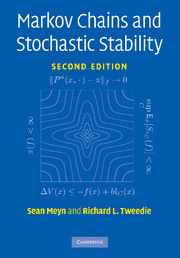Book contents
- Frontmatter
- Contents
- List of figures
- Prologue to the second edition
- Preface to the second edition
- Preface to the first edition
- I COMMUNICATION and REGENERATION
- 1 Heuristics
- 2 Markov models
- 3 Transition probabilities
- 4 Irreducibility
- 5 Pseudo-atoms
- 6 Topology and continuity
- 7 The nonlinear state space model
- II STABILITY STRUCTURES
- III CONVERGENCE
- IV APPENDICES
- Bibliography
- General index
- Symbols
7 - The nonlinear state space model
Published online by Cambridge University Press: 05 August 2012
- Frontmatter
- Contents
- List of figures
- Prologue to the second edition
- Preface to the second edition
- Preface to the first edition
- I COMMUNICATION and REGENERATION
- 1 Heuristics
- 2 Markov models
- 3 Transition probabilities
- 4 Irreducibility
- 5 Pseudo-atoms
- 6 Topology and continuity
- 7 The nonlinear state space model
- II STABILITY STRUCTURES
- III CONVERGENCE
- IV APPENDICES
- Bibliography
- General index
- Symbols
Summary
In applying the results and concepts of Part I in the domains of times series or systems theory, we have so far analyzed only linear models in any detail, albeit rather general and multidimensional ones. This chapter is intended as a relatively complete description of the way in which nonlinear models may be analyzed within the Markovian context developed thus far. We will consider both the general nonlinear state space model, and some specific applications which take on this particular form.
The pattern of this analysis is to consider first some particular structural or stability aspect of the associated deterministic control, or CM(F), model and then under appropriate choice of conditions on the disturbance or noise process (typically a density condition as in the linear models of Section 6.3.2) to verify a related structural or stability aspect of the stochastic nonlinear state space NSS(F) model.
Highlights of this duality are
(i) if the associated CM(F) model is forward accessible (a form of controllability), and the noise has an appropriate density, then the NSS(F) model is a T-chain (Section 7.1);
(ii) a form of irreducibility (the existence of a globally attracting state for the CM(F) model) is then equivalent to the associated NSS(F) model being a ψ-irreducible T-chain (Section 7.2);
(iii) the existence of periodic classes for the forward accessible CM(F) model is further equivalent to the associated NSS(F) model being a periodic Markov chain, with the periodic classes coinciding for the deterministic and the stochastic model (Section 7.3).
- Type
- Chapter
- Information
- Markov Chains and Stochastic Stability , pp. 146 - 168Publisher: Cambridge University PressPrint publication year: 2009

